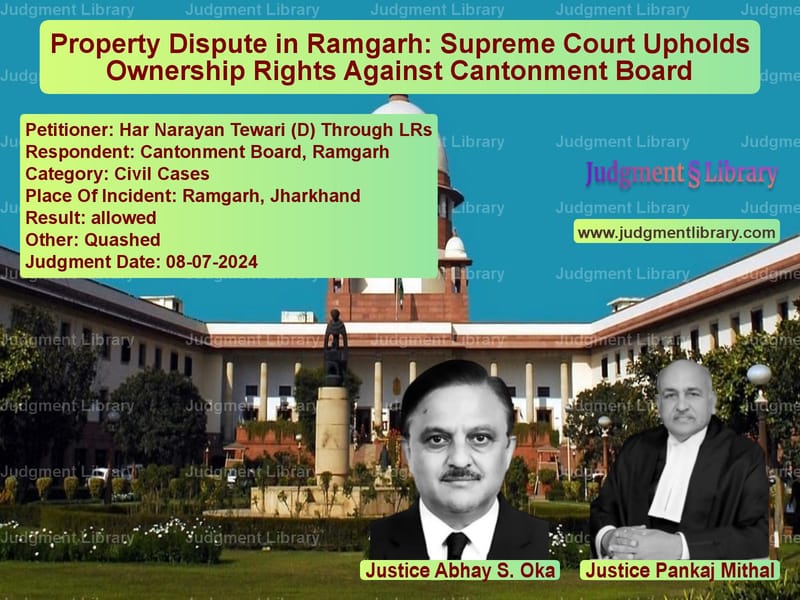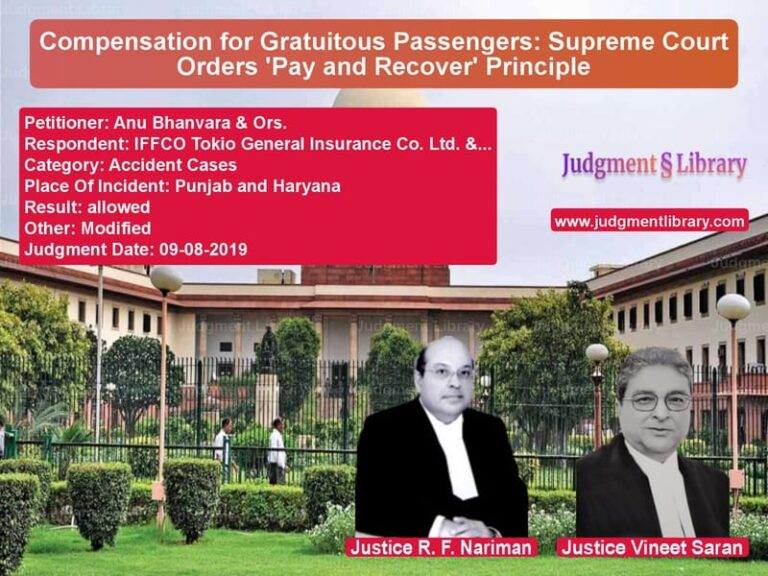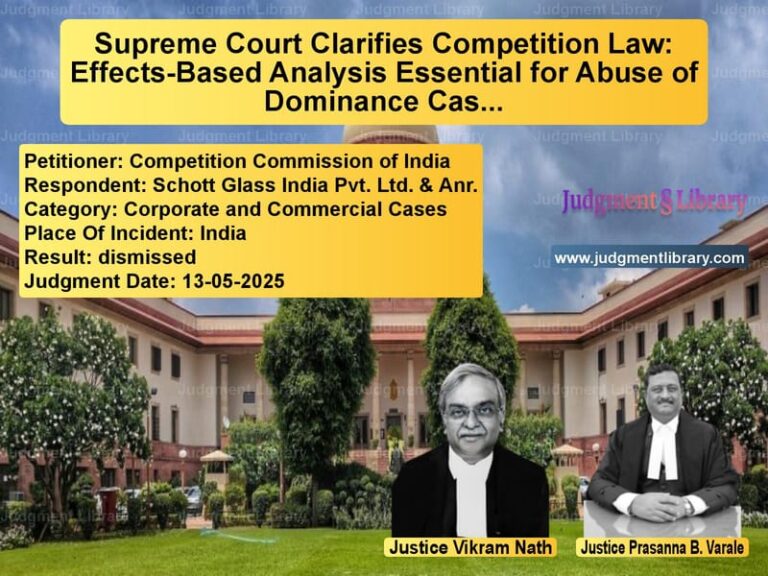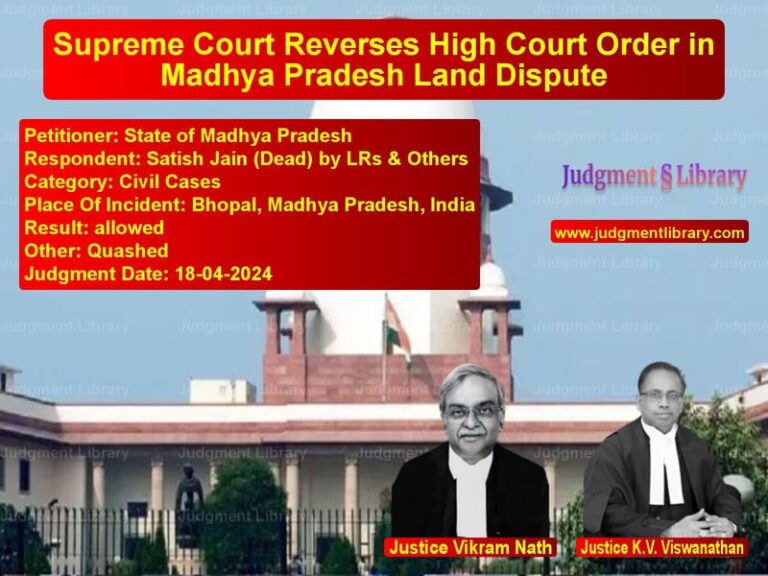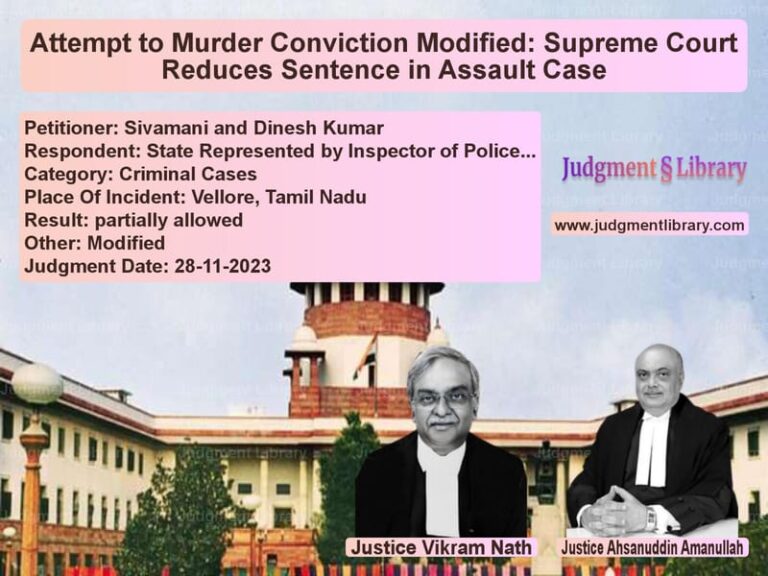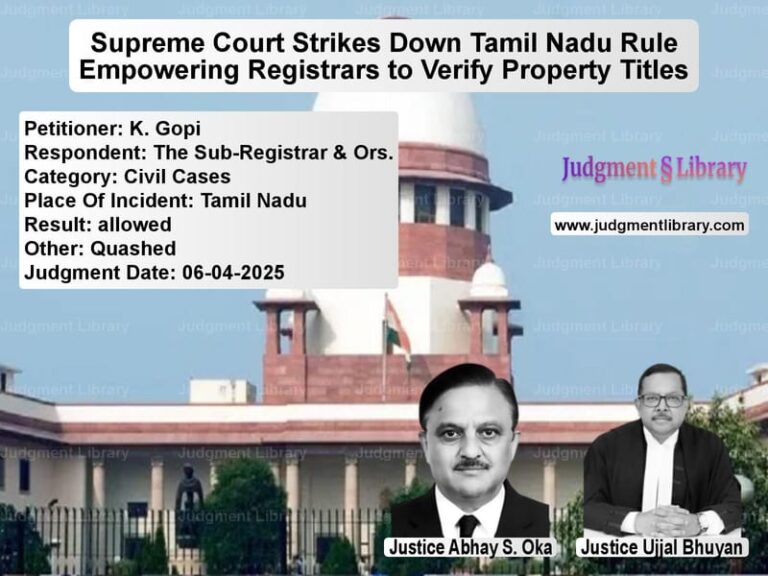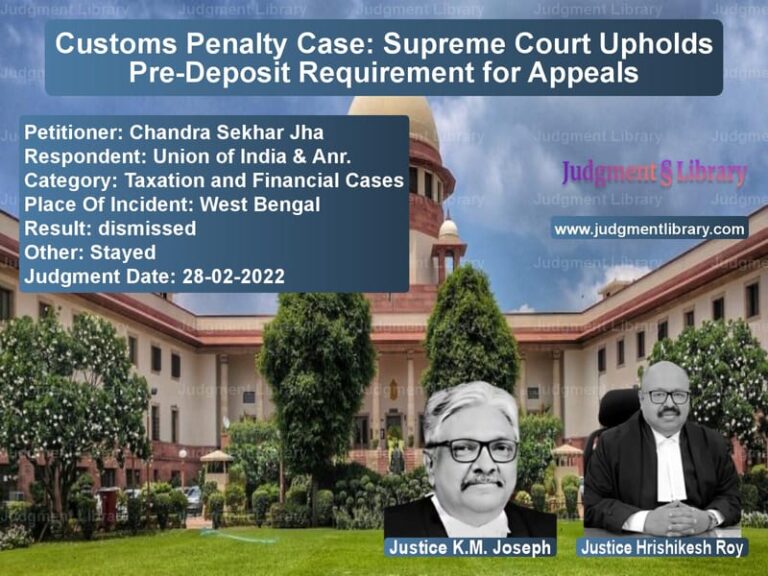Property Dispute in Ramgarh: Supreme Court Upholds Ownership Rights Against Cantonment Board
The Supreme Court of India recently delivered a landmark judgment in the case of Har Narayan Tewari (D) Through LRs vs. Cantonment Board, Ramgarh, settling a long-standing property dispute over 0.30 acres of land in Ramgarh, Jharkhand. The Court overturned the decisions of the High Court and the First Appellate Court, restoring the trial court’s ruling in favor of the appellant.
Background of the Case
The dispute centered around land measuring 0.12 acres of Plot No.432 and 0.18 acres of Plot No.438, totaling 0.30 acres, located within the jurisdiction of the Cantonment Board, Ramgarh. The appellant, Har Narayan Tewari, claimed ownership based on a settlement granted by the erstwhile Raja of Ramgarh in 1942. The property was allegedly handed over to him in exchange for a salami payment of Rs. 2,000.
In 1964, a related suit (Title Suit No.8/64) was filed by Maharani Lalita Rajya Lakshmi, wife of Raja Bahadur Kamakshya Narayan Singh, seeking ownership over 5.38 acres of land, which included the disputed plots. The court dismissed her claim in 1984. However, a fresh suit (Title Suit No.9/89) was filed by Har Narayan Tewari in 1989, challenging the claim of the Cantonment Board over the 0.30-acre land.
Key Legal Issues Considered
- Whether the suit was barred by the principle of res judicata.
- Whether the appellant had a valid title to the property.
- Whether the Cantonment Board had any legal claim over the disputed land.
Arguments by the Petitioner (Har Narayan Tewari & LRs)
- The Raja of Ramgarh settled the land in the appellant’s favor in 1942, and his name was duly mutated in 1963.
- The land was never part of the 2.55 acres handed over to the Cantonment Board for dispensary and doctor’s quarters.
- The 1964 suit filed by Maharani had no bearing on the appellant’s claim, as it was dismissed due to lack of evidence.
- The Cantonment Board had never legally acquired the disputed land and was illegally claiming possession.
Arguments by the Respondents (Cantonment Board, Ramgarh)
- The property in question was part of the land under their control.
- The suit was barred by res judicata as it was related to the previously dismissed case.
- Any claims regarding settlement by the Raja in favor of the appellant were not legally binding.
Trial Court Judgment
The trial court ruled in favor of the appellant, holding that:
- The land was indeed settled in the appellant’s favor by the Raja.
- The Cantonment Board had no valid claim over the land.
- The appellant’s name was duly recorded in the revenue records.
First Appellate Court and High Court Judgments
The First Appellate Court reversed the trial court’s ruling, holding that the suit was barred by res judicata. The High Court upheld this ruling without framing any substantial question of law.
Supreme Court Judgment
The Supreme Court set aside the rulings of the High Court and the First Appellate Court, restoring the trial court’s judgment. The key observations included:
- The doctrine of res judicata did not apply as the previous suit had not adjudicated the specific rights of the appellant.
- The Cantonment Board had never acquired title over the land.
- The settlement of land in favor of the appellant by the Raja was legally valid.
The Court ruled:
“The First Appellate Court and the High Court manifestly erred in dismissing the suit on the ground of res judicata. The appellant’s rights were never adjudicated in the previous litigation.”
Impact of the Judgment
- Protection of Private Landowners: The ruling reinforces the principle that private landowners cannot be dispossessed without legal acquisition.
- Judicial Review of Government Claims: Courts must scrutinize claims by government bodies before depriving individuals of their property.
- Clarification on Res Judicata: The judgment clarifies that prior litigation does not automatically bar future claims unless the specific rights have been adjudicated.
Conclusion
The Supreme Court’s ruling reaffirms the importance of legal ownership and due process in property disputes. By restoring the appellant’s rights, the Court has ensured justice in a case that spanned multiple decades.
Petitioner Name: Har Narayan Tewari (D) Through LRs.Respondent Name: Cantonment Board, Ramgarh.Judgment By: Justice Abhay S. Oka, Justice Pankaj Mithal.Place Of Incident: Ramgarh, Jharkhand.Judgment Date: 08-07-2024.
Don’t miss out on the full details! Download the complete judgment in PDF format below and gain valuable insights instantly!
Download Judgment: har-narayan-tewari-(-vs-cantonment-board,-ra-supreme-court-of-india-judgment-dated-08-07-2024.pdf
Directly Download Judgment: Directly download this Judgment
See all petitions in Property Disputes
See all petitions in Succession and Wills
See all petitions in Landlord-Tenant Disputes
See all petitions in Judgment by Abhay S. Oka
See all petitions in Judgment by Pankaj Mithal
See all petitions in allowed
See all petitions in Quashed
See all petitions in supreme court of India judgments July 2024
See all petitions in 2024 judgments
See all posts in Civil Cases Category
See all allowed petitions in Civil Cases Category
See all Dismissed petitions in Civil Cases Category
See all partially allowed petitions in Civil Cases Category

